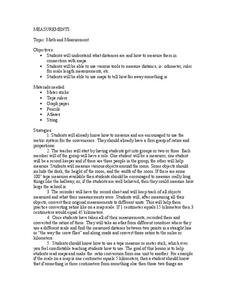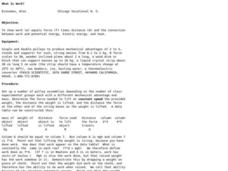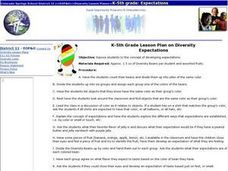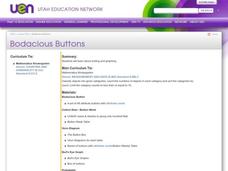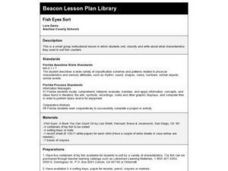Curated OER
Is Your Order Up or Down?
Young scholars practice ordering numbers. In this number sense lesson, students collaborate to order whole numbers from greatest to least and least to greatest. Young scholars also practice the concept by using educational software.
Alabama Learning Exchange
Leo Lionni’s Little Blue and Little Yellow
Students use the Internet to research the author Leo Lionni, then rewrite and illustrate one of his stories.
Alabama Learning Exchange
Very Busy Spiders
Young scholars identify spider parts, and distiguish between web building and wandering spiders. They complete a spider webquest.
Alabama Learning Exchange
"Nuts" about Peanuts!
Young scholars describe the characteristics of a peanut and peanut butter using their five senses. They record their observations and descriptions on a graphic organizer. They may use the Internet to look up answers to questions about...
Helping with Math
What is Division?
In this division assignment, math learners can use counters to help solve simple division problems or draw pictures to show how things can be shared. Real-world scenarios allow youngsters to apply division concepts. The webpage contains...
Curated OER
Sorting Gourds
Students discover different types of gourds. In this plant comparison lesson, students compare and contrast several types of gourds based on shape, color and texture. Students observe a video clip based on sorting gourds.
Curated OER
Math and Measurement
Students use the correct tool to measure distances. In this geometry lesson plan, students use an odometer and ruler correctly as they study maps. They describe how far way something is.
Curated OER
Fractions in Shapes
First graders explore fractions with manipulatives. In this fraction lesson, 1st graders use paper foods such as sandwiches and pizza in order to find halves, thirds, fourths, eighths, and more. This lesson is divided up into 3 tiers...
Curated OER
Plate Tectonics Boundaries
Young scholars discover how to create a model of tectonic plates and study the interactions of these plates as they slowly move on the asthenosphere. They see and experience what happens at each type of plate boundary and why there are...
Curated OER
Math-Addition
Second graders practice adding numbers that add up to less than 100. In this addition lesson, 2nd graders use candy to practice adding after participating in a demonstration lesson. They complete a worksheet, and an assessment.
Curated OER
What is Work?
Learners investigate the connection between work, potential energy, kinetic energy, and heat. In this physics lesson, students use pulleys to produce mechanical advantages and incline planes to demonstrate energy conversion.
Curated OER
Diversity Expectations
Students categorize different items into categories of characteristics to demonstrate diversity. In this diversity lesson plan, students then relate the items to people and their diversity.
Curated OER
I Spy Shapes
Students play a game in which they name geometric shapes. In this geometric shape lesson, students ask "yes and no" questions to determine which shape one of their classmates has chosen. They ask questions that lead them to the name of...
Curated OER
The Number Partner
First graders study number pairs and identify number pairs that sum to numbers from 10 to 30. They use number pairs to solve addition and subtraction problems. They make sensible estimates and check the reasonableness of answers.
Curated OER
Make a 100
Second graders develop an understanding of 100 and the quantity for which it stands and examine the relationship between 100 and 10 by estimating the number of jelly beans in a jar.
Curated OER
Leyden Jar: Static Electricity
Learners experiment with a Leyden Jar, a device that stores electrical charges. A large voltage can be built up in this jar by adding more and more charge. The modern name for this device is a capacitor.
Curated OER
Newton's Second Law
In this Newton's law of motion worksheet, students review the concepts and equation associated with Newton's second law of motion. Students complete 7 matching and 5 true or false questions.
Curated OER
Football Mania
Students practice previously- learned throwing and catching skills and offensive/defensive strategies in a game-like situation.
Curated OER
What Makes Ten
Students investigate the concept of ten and how it is part of the real number system. They find the quantity of ten using as many combinations as possible. They can count using manipulatives, write on paper, or by doing mental math.
Curated OER
Conic Sections and Locii
Students differentiate between ellipse and hyperbola. In this algebra lesson, students graph and solve elliptical equations. They use the cabri program to create the different conics and move them around.
Curated OER
Wacky Water Critters
Students visit a local creek or stream. They collect water samples from the creek and observe and sort the "water critters" they find in the sample, observing smaller organisms under a microscope if necessary. They identify each organism...
Curated OER
Bodacious Buttons
First graders graph a data set. Given a set of buttons, 1st graders sort them into categories using specific attributes. They graph the number of buttons in their set based on their attributes using a variety of graphs. Students share...
Curated OER
Fish Eyes Sort
Students sort, classify and write about what characteristics they used to sort fish counters.






